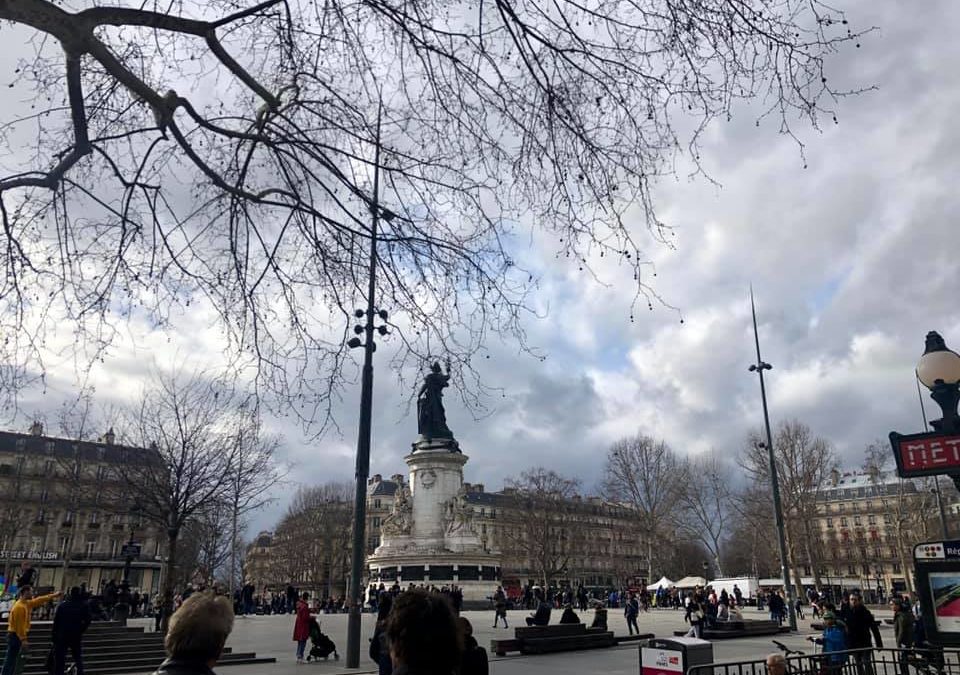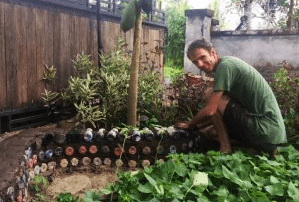I am really excited… I think we’ve found an important new word for a concept that has pressing modern significance. A few weeks ago, Ani and I were immersed in the Bandung Spirit conference in Paris and Le Havre. On the first day, Dr. Seema Parhihar from Kirori Mal College, University of Delhi gave the introductory talk at the conferences initiation at a lecture hall in the Sorbonne, University of Paris. She spoke about all the problems in the world today, and how any solution, to truly be a solution would have to rise above gender, class, economics, geography, etc.
This is precisely one of the phenomenons of the ecobrick movement!
Plastic connects everyone across all those very boundaries. Whether your rich, poor, man, woman, young, old, or living in India or Canada, you’ve got plastic and the problem of what to do with it. Consequently, our ecobrick workshops tend to be demographic mixes that cut across all those classes. We’re really proud of this and are only starting to realize its importance.
However, it is also a phenomenon that I had been struggling to distill into a principle. As I wrote down some of Dr. Seema’s words, it struck me that there was no simple term for this idea of rising above classes and barriers. Indeed, my own writing about it in our academic paper, had required a sentence or two to describe:
“Ecobricking it turns out, unites rich and poor, east and west, young and old, men and women, and everyone in between”.
— Ecobricks.org/principles
Dr. Seema is right though, the concept is so important that it categorically makes or breaks a potential social solution– in other words, if a modern solution doesn’t transcend all these boundaries, then its not really a solution. Instead it is perpetuating the very same social, gender, economic and cultural classes– and these are the very problem! This is corroborated in my experience working and living around the world and seeing various attempted technological solutions. It is also flushed out in this recent essay on how “wealth inequality [rich/poor divide] is the real culprit for climate change”.
 We had been thinking of going with the term ‘transclass‘, but Dr. Seema’s presentation on the economic situation in India got me thinking about the ancient Indian caste system. “Caste” is a word that connotates (for me anyway) antiquated social structures that perpetuate a systematic injustice– in particular in India. The interesting thing is that people beleived (and some still do) that caste is an existential reality for people.
We had been thinking of going with the term ‘transclass‘, but Dr. Seema’s presentation on the economic situation in India got me thinking about the ancient Indian caste system. “Caste” is a word that connotates (for me anyway) antiquated social structures that perpetuate a systematic injustice– in particular in India. The interesting thing is that people beleived (and some still do) that caste is an existential reality for people.
We’ve come to understand that castes aren’t innate, but a cognitively devised social structure. Only to the extent that someone believes and puts energy into the caste concept does it have social consequences (i.e. the systemic injustice). By believing something else (changing one’s religion, politically supporting change, moving out of India, etc.) the force of social structure is diminished. But most of all, the concept’s imposition on reality can be reduced by simply participating in social structures in which the concept is obsolete.
Let’s take a modern example close to home for all of us.
Perhaps the deepest rooted caste category of all is our “humanity”. When we talk of human rights and seek to avoid environmental contamination because it will effect human health, tourism, the economy, and our grandchildren we are very much mired in an archaic anthropocentric world view. Of course, humanity is just one species on the planet, whose fate is inextricably intertwined with all our fellow companions on planet earth. To forget about them, is not just short-sighted but ultimately damaging for us all.
It is fascinating to see how ecobricking reaches this transcension. Ask a teenager in the UK why she is ecobricking and she could easily say “for the turtles”. A man in Indonesian could likewise easily say “for the whales”. This motivation and intention beyond our old anthropocentric caste system is crucial.
We’ve got lots of other social structure that benefit us to transcend. They are similar caste-like relics of archaic paradigms and meta-narratives. Once labeled so, then we can work to transcend them and step into movements in which they are obsolete. And by giving a term to this principle of rising above antiquated classifications, we can define our movements as such.
Transcaste!


